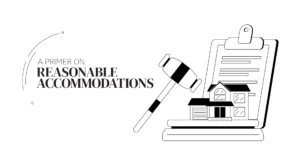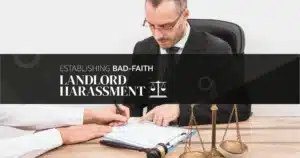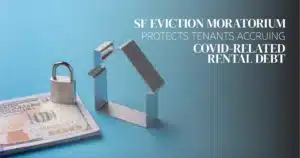Jill came back home one day and found her utilities had been shut off. It was the middle of winter. Without a heating system, she worried her kids would get sick. This was the most anxious she had felt in a long time.
Jill is not the only one who has to go through this. Renters all across California experience some form of harassment from their landlords, and the sad part is that it’s illegal. There are legal protections in place that should prevent landlords from using intimidating tactics like this.
This is why tenants need to contact a tenant rights attorney who has experience dealing with these threats and knows how to handle landlord misconduct. Sometimes it isn’t enough for a witness to simply be there — an attorney needs to be present to ensure proper action is taken.
You don’t have to deal with intimidation from your landlord alone. With the right attorney by your side, you can ensure that you have a safe space and that your rights are never infringed.
What Is Considered Tenant Harassment in California
Tenant harassment can vary greatly. Sometimes it looks like using fear and pressure to push renters out; other times, it’s constant calling or texting at inappropriate hours, asking to be let in. The goal is the same: control.
Under California Civil Code § 1940.2 and 1942.5, landlords are prohibited from harassing or retaliating against tenants who exercise their legal rights. These laws also protect renters from retaliation when they exercise their legal rights, so renters don’t fear speaking up.
If you’re still unsure what harassment looks like, here are a few examples of harassment tactics that are all too common:
- Shutting off utilities (water, heat, or electricity)
- Entering your home without proper notice or threatening you when you exercise your rights or ask for reasonable accommodations
- Intimidating behavior, such as verbal abuse
- Refusing to make repairs and pressuring renters to move after they send reminders
- Filing false reports or lawsuits to intimidate renters
In some cases, a landlord might even remove your belongings from the property. This is called self-help eviction, and it’s illegal. It’s important to remember that a landlord must use the proper legal channels to start the eviction process.
A landlord must first serve a written notice to terminate the tenancy (for example, a 3-day or 30-day notice). If the tenant does not comply, the landlord must then file an unlawful detainer action in court to obtain a legal eviction order.
If the proper legal channel isn’t used, you don’t have to accept your fate. You can call a tenant rights attorney and map out your plan of action.
How to Document and Report Tenant Harassment
Now that you know what harassment looks like and that it’s illegal, it’s time to do something about it. It’s important to keep records of all your interactions with your landlord, even if there hasn’t been harassment yet.
Every detail can make a big difference when reviewing a case in court, and it’s a way to protect your rights as a tenant. If you’re ever in a difficult situation, this documentation will serve as critical evidence.
Here’s what you should do:
- Record dates, times, and descriptions of every incident, even small ones.
- If it happens in text or email, keep records of all communications.
- Take photos and videos of property damage, and in case of illegal entry, record the incident.
- If there’s neglect, bring it to your landlord’s attention and clearly ask them to fix it.
- Ask a witness — like a neighbor or roommate — to be present during interactions. Their testimony can help prove the landlord was harassing you in court.
If you already have sufficient evidence to prove harassment, here’s how to report it:
- File a complaint with your city’s housing authority or rent board.
- Get in touch with a tenant rights attorney to represent you and guide you through the process.
At this point, most landlords stop once the issue is brought to the attention of the relevant authorities — but some don’t.
Should you lose heart? No!
At The Law Firm for Tenant Rights, Inc., we ensure that your rights are upheld and your landlord is held accountable. We are prepared to represent you in court and make sure you feel safe in your home.
What Are the Consequences for Landlords Who Harass Tenants?
Harassing tenants is against the law. There are consequences for landlords. If a landlord is found guilty of harassment, a court may order the landlord to pay the tenant’s damages, which can include emotional distress, financial losses, attorney’s fees, and possibly civil penalties.
If harassment persists or becomes a repeated offense, some conduct may even lead to criminal charges — especially in severe or extreme cases — depending on the facts and local ordinances.
When your landlord has crossed the line, you must take legal action. With the help of The Law Firm for Tenant Rights, Inc., you can make sure you get the justice you deserve.
You Are Not Alone!
Tenants should never have to face harassment in their own homes. This is not just a violation of California law; it’s a violation of basic human rights. The Law Firm for Tenant Rights, Inc. protects renters from unfair treatment, intimidation tactics, and abuse.
We stand up to your landlord and ensure they are held accountable for creating a hostile living environment. Call The Law Firm for Tenant Rights, Inc. today and schedule a free consultation.
Frequently Asked Questions
- What is tenant harassment in California?
Tenant harassment takes various forms, including when a landlord intentionally tries to pressure, intimidate, or force a tenant to move out through illegal means such as threats, utility shutoffs, or constant disturbances.
- Is tenant harassment illegal in California?
Yes. Under California Civil Code §§1940.2 and 1942.5, tenant harassment is strictly prohibited, and landlords who engage in it can face severe legal penalties.
- What are some examples of landlord harassment?
Examples include entering your home without notice, cutting off water or electricity, illegally raising rent, or issuing threats and false eviction notices.
- Can my landlord evict me for reporting harassment?
No. Retaliation for exercising your tenant rights, such as reporting harassment or unsafe conditions, is illegal in California.
- What should I do if my landlord is harassing me?
Document everything. Keep messages, letters, photos, and videos, and contact a tenant rights attorney to help you take legal action.
- How can I prove tenant harassment?
You can prove harassment with evidence such as texts, emails, photos, witness statements, and official reports to housing authorities or the police.
- What penalties can a landlord face for harassment?
Landlords may be required to pay damages and attorney’s fees, and could even face criminal charges for repeated or severe harassment.
- Are there extra protections in certain California cities?
Yes. Cities like Los Angeles, San Francisco, Berkeley, Santa Monica, Alameda, and Oakland have local ordinances that add extra tenant protections and stronger penalties for harassment.
- Can I sue my landlord for emotional distress?
Yes. If harassment has caused you emotional harm or stress, you may be entitled to compensation through a lawsuit.
- How can The Law Firm for Tenant Rights, Inc. help me?
The firm can help you file a harassment claim, represent you in court, and ensure your landlord is held accountable — all while protecting your right to a safe, peaceful home.





